8 Mar 2014 | Azerbaijan News, News and features
International Women’s Day is a day to remember violence against women, the education gap, the wage gap, online harassment, everyday sexism, the intersection between sexism and other -isms, and a whole host of other issues to make us realise we’ve still got a long way to go. A day to demand continued progress, and a day to pledge to work to achieve it.
But it is also a day to celebrate. To appreciate the fantastic achievements that are made every day, everywhere, by women from all walks of life. It’s a day to be grateful to the women who dedicate their lives to fighting on the front lines to protect rights vital to us all. We want to shine the spotlight on women who have stood up for freedom of expression when it’s not the easy or popular thing to do, against fierce opposition and often at great personal risk. The following eight women have done just that. We know there are many, many more. Tell us about your female free speech hero in the comments or tweet us @IndexCensorship.
Meltem Arikan — Turkey
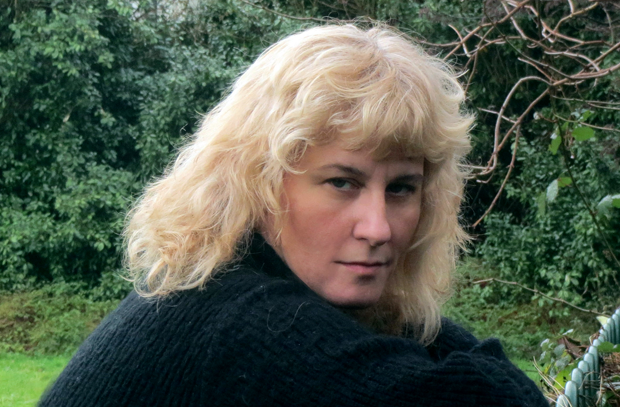
Meltem Arikan
Arikan is a writer who has long used her work to challenge patriarchal structures in society. He latest play “Mi Minor” was staged in Istanbul from December 2012 to April 2013, and told the story of a pianist who used social media to challenge the regime. Only a few months after, the Gezi Park protests broke out in Turkey. What started as an environmental demonstration quickly turned into a platform for the public to express their general dissatisfaction with the authorities — and social media played a huge role. Arikan was one of many to join in the Gezi Park movement, and has written a powerful personal account of her experiences. But a prominent name in Turkey, she was accused of being an organiser behind the protests, and faced a torrent of online abuse from government supporters. She was forced to flee, now living in exile in the UK.
I realised that we were surrounded, imprisoned in our own home and prevented from expressing ourselves freely.
Anabel Hernández — Mexico

Anabel Hernández (Image: YouTube)
Hernández is a Mexican journalist known for her investigative reporting on the links between the country’s notorious drug cartels, government officials and the police. Following the publication of her book Los Señores del Narco (Narcoland), she received so many death threats that she was assigned round-the-clock protection. She can tell of opening the door to her home only to find a decapitated animal in front of her. Before Christmas, armed men arrived in her neighbourhood, disabled the security cameras and went to several houses looking for her. She was not at home, but one of her bodyguards was attacked and it was made clear that the visit — from people first identifying themselves as members of the police, then as Zetas — was because of her writing.
Many of these murders of my colleagues have been hidden away, surrounded by silence – they received a threat, and told no one; no one knew what was happening…We have to make these threats public. We have to challenge the authorities to protect our press by making every threat public – so they have no excuse.
Amira Osman — Sudan
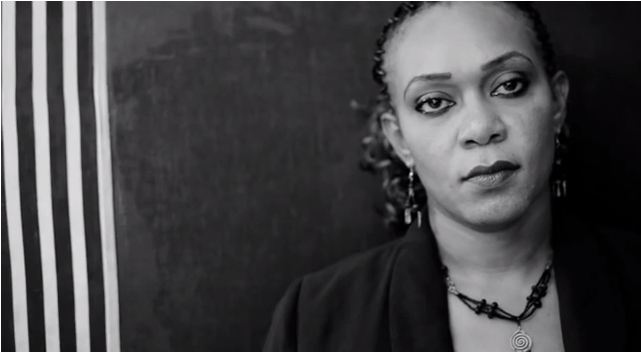
Amira Osman (Image: YouTube)
Amira Osman, a Sudanese engineer and women’s rights activist was last year arrested under the country’s draconian public order act, for refusing to pull up her headscarf. She was tried for “indecent conduct” under Article 152 of the Sudanese penal code, an offence potentially punishable by flogging. Osman used her case raise awareness around the problems of the public order law. She recorded a powerful video, calling on people to join her at the courthouse, and “put the Public Order Law on trial”. Her legal team has challenged the constitutionality of the law, and the trial as been postponed for the time being.
This case is not my own, it is a cause of all the Sudanese people who are being humiliated in their country, and their sisters, mothers, daughters, and colleagues are being flogged.
Fadiamata Walet Oumar — Mali
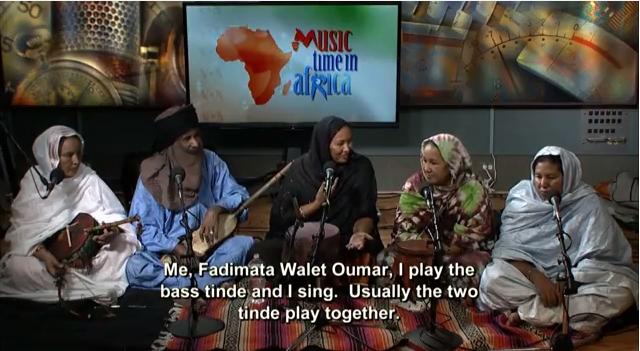
Fadiamata Walet Oumar with her band Tartit (Image: YouTube)
Fadiamata Walet Oumar is a Tuareg musician from Mali. She is the lead singer and founder of Tartit, the most famous band in the world performing traditional Tuareg music. The group work to preserve a culture threatened by the conflict and instability in northern Mali. Ansar Dine, an islamists rebel group, has imposed one of the most extreme interpretations of sharia law in the areas they control, including a music ban. Oumar believes this is because news and information is being disseminated through music. She fled to a refugee camp in Burkina Faso, where she has continued performing — taking care to hide her identity, so family in Mali would not be targeted over it. She also works with an organisation promoting women’s rights.
Music plays an important role in the life of Tuareg women. Our music gives women liberty…Freedom of expression is the most important thing in the world, and music is a part of freedom. If we don’t have freedom of expression, how can you genuinely have music?
Khadija Ismayilova — Azerbaijan

Khadija Ismayilova
Ismayilova is an award-winning Azerbaijani journalist, working with Radio Free Europe/Radio Liberty. She is know for her investigative reporting on corruption connected to the country’s president Ilham Aliyev. Azerbaijan has a notoriously poor record on human rights, including press freedom, and Ismayilova has been repeatedly targeted over her work. She was blackmailed with images of an intimate nature of her and her boyfriend, with the message to stop “behaving improperly”. This February, she was taken in for questioning by the general prosecutor several times, accused of handing over state secrets because she had met with visitors from the US Senate. In light of this, she posted a powerful message on her Facebook profile, pleading for international support in the event of he arrest.
WHEN MY CASE IS CONCERNED, if you can, please support by standing for freedom of speech and freedom of privacy in this country as loudly as possible. Otherwise, I rather prefer you not to act at all.
Jillian York — US
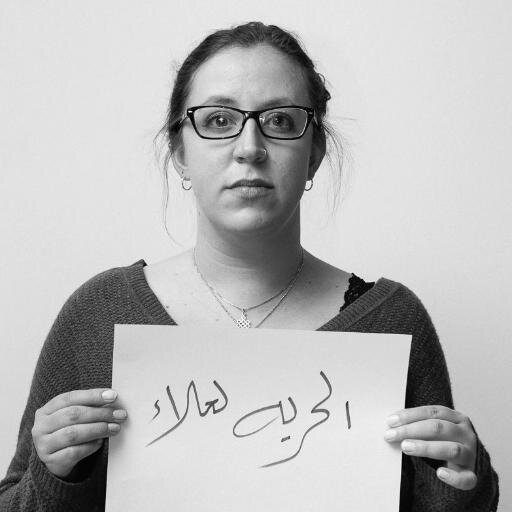
Jillian York (Image: Jillian C. York/Twitter)
Jillian York is a writer and activist, and Director of Freedom of Expression at the Electronic Frontier Foundation (EFF). She is a passionate advocate of freedom of expression in the digital age, and has spoken and written extensively on the topic. She is also a fierce critic of the mass surveillance undertaken by the NSA and other governments and government agencies. The EFF was one of the early organisers of The Day We Fight Back, a recent world-wide online campaign calling for new laws to curtail mass surveillance.
Dissent is an essential element to a free society and mass surveillance without due process — whether undertaken by the government of Bahrain, Russia, the US, or anywhere in between — threatens to stifle and smother that dissent, leaving in its wake a populace cowed by fear.
Cao Shunli — China
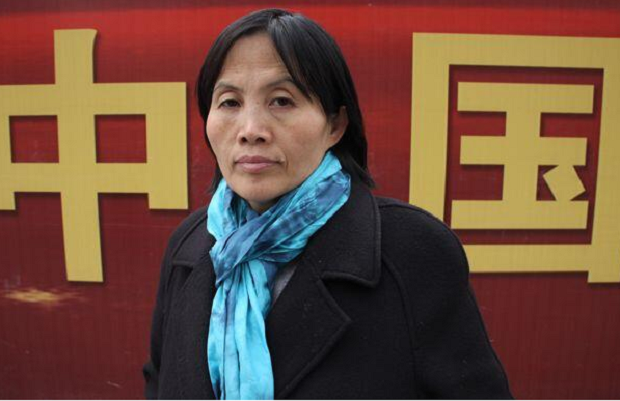
Cao Shunli (Image: Pablo M. Díez/Twitter)
Shunli is an human rights activist who has long campaigned for the right to increased citizens input into China’s Universal Periodic Review — the UN review of a country’s human rights record — and other human rights reports. Among other things, she took part in a two-month sit-in outside the Foreign Ministry. She has been targeted by authorities on a number of occasions over her activism, including being sent to a labour camp on at least two occasions. In September, she went missing after authorities stopped her from attending a human rights conference in Geneva. Only in October was she formally arrested, and charged for “picking quarrels and promoting troubles”. She has been detained ever since. The latest news is that she is seriously ill, and being denied medical treatment.
The SHRAP [State Human Rights Action Plan, released in 2012] hasn’t reached the UN standard to include vulnerable groups. The SHRAP also has avoided sensitive issue of human rights in China. It is actually to support the suppression of petitions, and to encourage corruption.
Zainab Al Khawaja — Bahrain
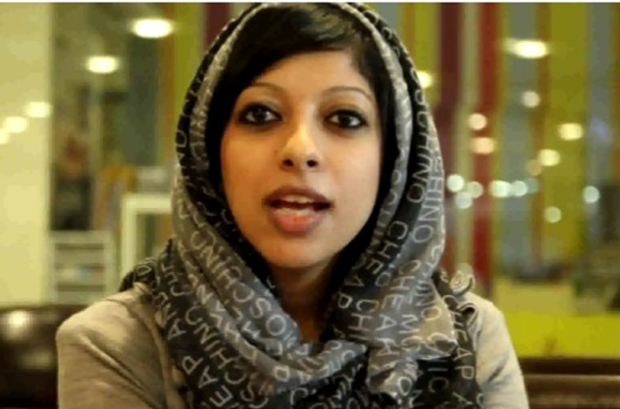
Zainab Al Khawaja
Al Khawaja is a Bahraini human rights activist, who is one of the leading figures in the Gulf kingdom’s ongoing pro-democracy movement. She has brought international attention to human rights abuses and repression by the ruling royal family, among other things, through her Twitter account. She has also taken part in a number of protests, once being shot at close range with tear gas. Al Khawaja has been detained several times over the last few years, over “crimes” like allegedly tearing up a photo of King Hamad bin Isa Al Khalifa. She had been in jail for nearly a year when she was released in February, but she still faces trials over charges like “insulting a police officer”. She is the daughter of prominent human rights defender Abdulhadi Al Khawaja, who is currently serving a life sentence.
Being a political prisoner in Bahrain, I try to find a way to fight from within the fortress of the enemy, as Mandela describes it. Not long after I was placed in a cell with fourteen people—two of whom are convicted murderers—I was handed the orange prison uniform. I knew I could not wear the uniform without having to swallow a little of my dignity. Refusing to wear the convicts’ clothes because I have not committed a crime, that was my small version of civil disobedience.
This article was posted on March 8, 2014 at indexoncensorship.org
21 Feb 2014 | Azerbaijan News, News and features

Azerbaijani Radio Free Europe/Radio Liberty journalist Khadija Ismayilova has been questioned by authorities three times over the past week, over allegations that she handed over state secrets to the US.
Ismayilova — an award-winning investigative journalist, who has in the past been blackmailed for her coverage of government corruption — was called first called in for questioning by the country’s General Prosecutor on 18 September. This came “after pro-government media outlets claimed that she had handed files on Azerbaijani opposition politicians and other prominent figures over to the aides, who were allegedly working as US intelligence agents,” reports RFE/RL.
She believes it was due to a dinner she had with US senate staffers in January. “The prosecutor in charge of my case told me that they have information that I passed some kind of state secrets to visiting Americans. I told them it is impossible, since I don’t have any state secrets in my possession. This is an absurd allegation,” she said.
Fearing she might get arrested, she posted the following message on Facebook on Wednesday:
Things get more complicated here. So there are couple things I want to ask for:
TO INTERNATIONAL HUMAN RIGHTS ACTIVISTS
You are doing everything right. Keep doing it.
TO DEMOCRATIC COUNTRIES, DIPLOMATS, INTERNATIONAL ORGANIZATIONS
Just in case, I want to remind my request to international community in terms of possible advocacy actions regarding my possible arrest:
Some of you want to help, but can do it only with private diplomacy.
Thank you, but No.
WHEN MY CASE IS CONCERNED, if you can, please support by standing for freedom of speech and freedom of privacy in this country as loudly as possible. Otherwise, I rather prefer you not to act at all.
I don’t want any private diplomacy for my case. I don’t believe in human rights advocacy behind closed doors. People of my country need to know that human rights are supported.
I also don’t want any release-appreciation trade for my release. My possible arrest will be just one of the more than hundred politically motivated arrest and government of Azerbaijan has managed to use revolving doors of prisons for getting positive feedback from the West: releasing one prisoner, getting praised, arresting two.
TO FELLOW INTERNATIONAL JOURNALISTS
IF/WHEN I get arrested, I want you to make sure that your audience understand the reasons. Anti-corruption investigations are the reason of my arrest. The government is not comfortable with what I am doing. I am about to finish three investigations. I will make sure to finish them before anything happens, if not my editors and colleagues will finish and publish.
İnvestigations I am working on are on the same topic:
SELECTED REPORTS AND INVESTIGATIONS
Latest report (in Azeri) is about Czech company of Arzu Aliyeva, president’s daughter. The company is sold to tax minister’s advisor. Law bans officials from owning businesses and it is not clear where the 1,2 millions EUros are taken?
http://www.azadliq.org/content/article/25232145.html
2012 President awarded family stake in gold fields
Lucrative gold mining contract signed in 2007 with unknown companies is about to bring millions to it’s secret owners. Khadija Ismayilova and Nushaba Fatullayeva discover familiar names hidden behind offshore companies. Azerbaijani President’s daughters are among beneficiaries.
http://reportingproject.net/occrp/index.php/en/ccwatch/cc-watch-indepth/1495-azerbaijans-president-awarded-family-stake-in-gold-fields
2012 President’s family has a stake in Eurovision concert hall
Azerbaijan spends hundreds of millions to host Eurovision contest, with more than a hundred millions of public funds invested into the concert hall. Khadija Ismayilova’s investigation traces one of the subcontractors, involved to the expensive project and finds a link to the president’s family. The same company is involved into construction of state funded “patriot” project in 2010– the highest flagpole in the world (which became second highest after Tajikistan beat the record few months later) and shady privatization of energy construction facilities.
http://reportingproject.net/occrp/index.php/en/ccwatch/cc-watch-indepth/1499-presidents-family-benefits-from-eurovision-hall
2011 Tracking the President’s family business
For more than five years government of Azerbaijan lied to citizens about ownership of the mobile phone operator, naming German Siemens as an owner of Azerfon company, enjoying favorable conditions in the market, not available for competitors. The investigation reveals that president Aliyev’s daughters were behind Azerfon through shell companies in Panama.http://www.rferl.org/content/azerbaijan_president_aliyev_daughters_tied_to_telecoms_firm/24248340.html
2010 President Aliyev’s family and the illegal privatization of the public airport
The investigation conducted with Ulviyya Asadzade documented how President IlhamAliyev’s family was involved in the illegal privatization of the public bank and other parts of state owned Azerbaijan Airlines company, to benefit the Aliyev family. The government never publicly announced the privatization. The report was declared “the best investigation of Radio Free Europe Radio Liberty in 2010” among the 28 language services of the radio.http://www.rferl.org/content/Aliyevs_Azerbaijani_Empire_Grows_As_Daughter_Joins_The_Game/2127137.html
Today, she also used her Facebook page to call attention to a number of other attacks on press freedom in the past week. Ilgar Veliyev, a journalists with axar.az, resigned from his post following the website’s “smear campaign” against Ismayilova. Natiq Cavadli was fired from Bizim Yol newspaper after publishing an interview with an economics expert who has “revealed corruption in customs”, and Ayten Farhadova resigned from the same paper in solidarity. Yafez Hasanov from RFE/RL has received death threats in connection with his reporting on human rights violations in in Nakhchivan Autonomous Republic of Azerbaijan.
The state of press freedom in Azerbaijan is notably poor. An Index on Censorship report released in connection with the country’s recent presidential election highlighted the ongoing “clampdown on independent and critical media”.
This article was posted on 21 February 2014 at indexoncensorship.org
20 Dec 2013 | Azerbaijan, Azerbaijan News, Europe and Central Asia, News and features
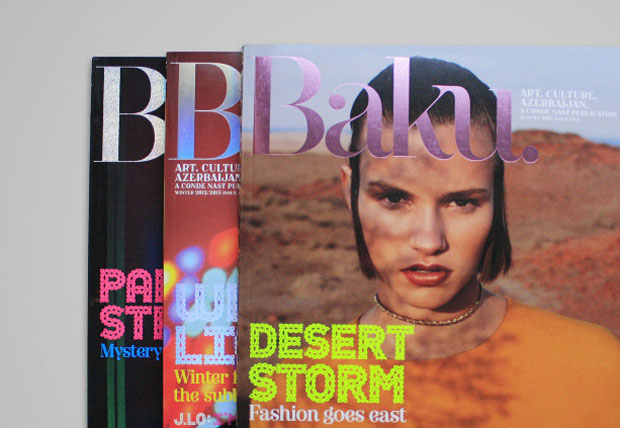
Earlier editions of Baku magazine
The contrast is stark. On one hand, you’ve got Azadliq — Azerbaijan’s leading independent newspaper — balancing on the brink of bankruptcy. Known for its critical coverage of the country’s repressive regime, led by President Ilham Aliyev (in a role he essentially inherited from his father Heydar), the paper has been under continuous economic attacks by the government. Defamation cases and payments being held back, among others things, have left the paper in serious danger of folding.
On the other hand, there’s Baku — the art and culture magazine with an Azerbaijani twist, brainchild of Aliyev’s daughter Leyla and co-published by Conde Nast — which recently celebrated its second birthday. A magazine so expensively produced it has its own special font probably doesn’t need to concern itself too much with sales figures and turnover.
The birthday bash was held at “vibrant Baku night spot Pacifico”, where “the champagne flowed and the band played into the night” and guests “toasted the title’s success”. I know this because I recently got my hands on issue 10 of the magazine, which hit the newsstands last week. The party was heavily featured in the society section, which also included appearances by Leyla herself, her sister Arzu and mother and First Lady Mehriban.
Somewhat ironically, I found a stack at an Index event exhibiting the work of Azerbaijani photographers capturing some of the country’s many protests. They were probably kindly donated by the representatives from the Azerbaijani embassy, who popped along to the event.
At first glance, Baku magazine seems like your typical glossy, upmarket mag, promoting the sort of grossly decadent lifestyle most of us would never come within a gold cobbled country mile of. However, it doesn’t take many page turns to sense that something is a bit off.
One of the first things that hits you is the near-obsession between creating links between Azerbaijan and the most glamorous, posh and high-culture aspects of western countries. “Walking along the Boulevard, the wide, tree-lined esplanade that sweeps the length of Baku’s Caspian seafront, is probably quite similar to walking along the Promenade des Anglais in Nice, during the cooler months,” coos Leyla Aliyeva, who also holds the role of Editor-in-Chief, in her Editor’s letter. There is also the feature on the country’s new ski resort, Shahdag. “Sure, it’s not Les Trois Vallees”, the article says. But you can still tuck into Tskian, “the Azerbaijani equivalent of a French alpine tartiflette”. While it is far from the only country to indulge in a bit of self-promotion, the idea of selling Azerbaijan as a modern, glamorous it-spot, seems to permeate the whole publication to a slightly comical extent. But considering they have in the past hired western PR companies to help polish the country’s international image, I guess this is to be expected.
It is further reflected in the editorial staff, filled with Darrens, Marias, Carolines and Simons. For a magazine about Azerbaijan, it doesn’t seem to have many actual Azerbaijanis working for it. Granted, supply might be a bit sparse, as there are a number of journalists among the country’s (at least) 142 political prisoners. Perhaps potential employees are afraid of being blackmailed, like investigative journalist Khadija Ismayilova? Or brutally attacked, like reporter Idrak Abbasov? Or maybe it’s because most of Azerbaijan’s media is otherwise engaged in state-controlled media?
Anyway, it is not surprising that a magazine called Baku, whose USP is Azerbaijan, focuses on all things, well, Azerbaijan. Some tenuous links are drawn, like the article suggesting that jewellery designer to the stars Loree Rodkin’s new collection will be inspired by Azerbaijan, essentially based on nice things she said at an exhibition in Baku. The interview with musical prodigy Nazrin Rashidova, who was born in the country, is only really jarring if you know that musicians, like Jamal Ali, who have dared criticise President Aliyev have allegedly been tortured by the police.
However, there are sections that seem to leave all pretence at the door, and go full on into that strange subtle-yet-obvious mode of PR-managed propaganda. The eight-page ode to Baku’s controversial beautification and modernisation project, under the guise of an interview with designer behind much of it, is issue 10’s most striking example. In fawning terms, it discusses the type of urban renewal that saw houses demolished and families evicted in the lead-up to the Eurovision Song Contest, hosted in the capital in 2012. We also get previews of yet-to-be unveiled treats. The Port Baku development, opening this spring, “is set to become the city’s premier luxury address” with “flagship stores from the world’s leading fashion brands” and exclusive apartments with “access to a 3000sq m leisure club and spa”. There are also plans to transform “a former power station complex into three destination restaurants and a nightclub.” And it goes on and on. A separate article announces the opening of the Fairmont hotel in one of the city’s Flame Towers. The 36-floor hotel will boast “Baku’s first French Bistro”.
It’s a dedicated effort to shift international attention away from corruption, poverty and the continuing attacks on human rights. But while this attempt to paint Azerbaijan as a harmonious and modern hot-spot might work for some, juxtaposed against the actual goings-on in the country, Baku magazine also manages to highlight the vast gulf between the life the regime and its elite circles lead, and the struggle of those fighting for democracy. In some ways, it is a very tangible symbol of the two Azerbaijans.
To buy a copy of the autumn issue of Index on Censorship, featuring work by some of Azerbaijan’s most brave photojournalists, click here.
This article was published on 20 Dec, 2013 at indexoncensorship.org
2 Dec 2013 | Azerbaijan, Azerbaijan News, Events
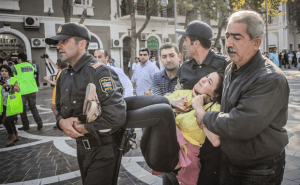 The world’s spotlight has moved on from Azerbaijan. But Azerbaijan is still beset by intimidation and violence, leading newspapers are under attack and independent journalists like Khadija Ismayilova and Idrak Abbasov continue to find themselves unable to work without fearing for their safety.
The world’s spotlight has moved on from Azerbaijan. But Azerbaijan is still beset by intimidation and violence, leading newspapers are under attack and independent journalists like Khadija Ismayilova and Idrak Abbasov continue to find themselves unable to work without fearing for their safety.
Join us for a photography exhibition and evening reception in the working artist’s studio at the ICA.
See the recent work of courageous photojournalists, hear from some of those involved in our recent mission there and raise a glass with us – for Human Rights Day, for Christmas and in solidarity with those not free.
Hosted in partnership with Art for Democracy and Platform.
TICKETS: RSVP to [email protected]
WHEN: 6:00 – 8:00pm, Thursday 12th December
WHERE: Institute Contemporary Art, The Mall, London, SW1Y 5AH
“Index has bylines Vanity Fair would kill for. Would that bylines were the only thing about Index people were willing to kill for” (The Boston Globe)
Presented thanks to the generous support of












